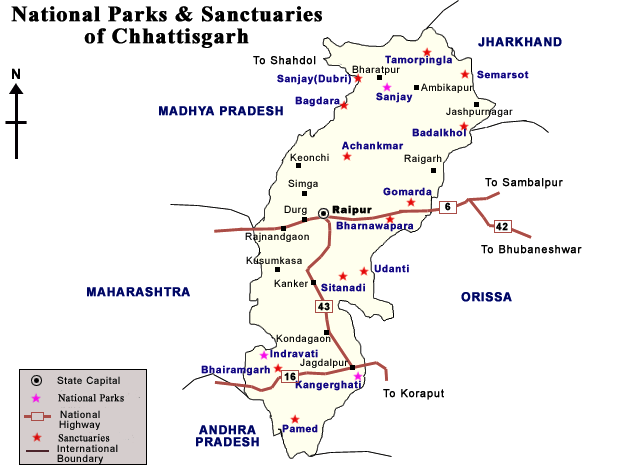Biodiversity & Environment
Lemru Elephant Reserve: Chhattisgarh
- 12 Jul 2021
- 5 min read
Why in News
Recently, the Chhattisgarh government has proposed to reduce the area of Lemru Elephant Reserve from 1,995 sq km to 450 sq km.
- The Centre gave its approval in 2007 for the creation of the 450 sq km Lemru Elephant Reserve and in 2019, the state government decided to increase the area to 1,995 sq km.
Key Points
- About:
- The reserve is located in the Korba district of Chhattisgarh.
- The reserve is aiming at reducing human-animal conflict and destruction of property in addition to providing a permanent habitat to the elephants.
- Earlier, the state government notified the reserve (Conservation Reserve) in October 2020 under Section 36A of the Wild Life (Protection) Act, 1972 (WLPA).
- Section 36A has a special provision that gives the Union government a say in the process of notification in case the land to be notified as conservation reserve has areas belonging to the Centre.
- Elephant reserves are not recognised under the WLPA.
- Reason for Reducing Size:
- The area proposed under the reserve is part of the Hasdeo Aranya forests, a very diverse biozone that is also rich in coal deposits.
- Of 22 coal blocks in the area, 7 have already been allotted with mines running in three, and in the process of being established in the other four.
- The biggest challenge in increasing the reserve area was that several coal mines would become unusable.
- Significance of Reserve:
- North Chhattisgarh alone is home to over 240 elephants. More than 150 elephants have died in the state over the last 20 years, including 16 between June and October 2020.
- Elephants in Chhattisgarh are relatively new; they started moving into undivided Madhya Pradesh (MP) in 1990.
- While MP had a policy of pushing back the animals coming from Jharkhand, after Chhattisgarh was formed, the lack of a formal policy allowed elephants to use as a corridor a route in the north and central parts of the state.
- Since these animals were relatively new, human-animal conflict started once elephants started straying into inhabited areas, looking for food.
- Other Protected Areas in Chhattisgarh:
- Achanakmar Tiger Reserve.
- Indravati Tiger Reserve.
- Sitanadi-Udanti Tiger Reserve
- Kanger Valley National Park
- Badalkhol Tamor Pingla Elephant Reserve.
Elephants
- About:
- Elephants are keystone species.
- There are three subspecies of Asian elephant – the Indian, Sumatran, and Sri Lankan.
- The Indian elephant has the widest range and accounts for the majority of the remaining elephants on the continent.
- Conservation Status of Indian Elephants:
- Wildlife Protection Act, 1972: Schedule I
- IUCN Red List: Endangered
- CITES: Appendix I
- India’s Initiatives for Conservation of Elephants:
- Gaj Yatra: A nationwide campaign to protect elephants, was launched on the occasion of World Elephant Day in 2017.
- Project Elephant: It is a centrally sponsored scheme which was launched in 1992.
- Seed Bombs: Recently Odisha’s Athagarh Forest Division has started casting seed balls (or bombs) inside different reserve forest areas to enrich food stock for wild elephants to prevent man-elephant conflict.
- Right of Passage of the Animals: Recently, the Supreme Court (SC) upheld the 2011 order of the Madras High Court (HC) on the Nilgiris elephant corridor, affirming the right of passage of the animals and the closure of resorts in the area.
- International initiatives to conserve Elephants:
- The Monitoring the Illegal Killing of Elephants (MIKE) programme, launched in 2003, is an international collaboration that tracks trends in information related to the illegal killing of elephants from across Africa and Asia, to monitor effectiveness of field conservation efforts.







